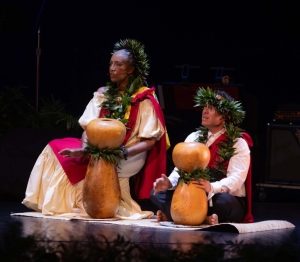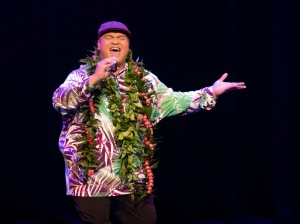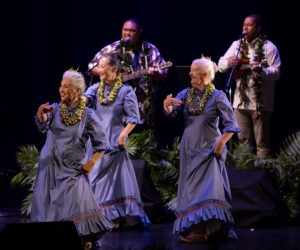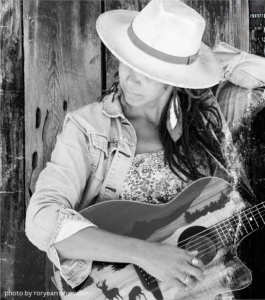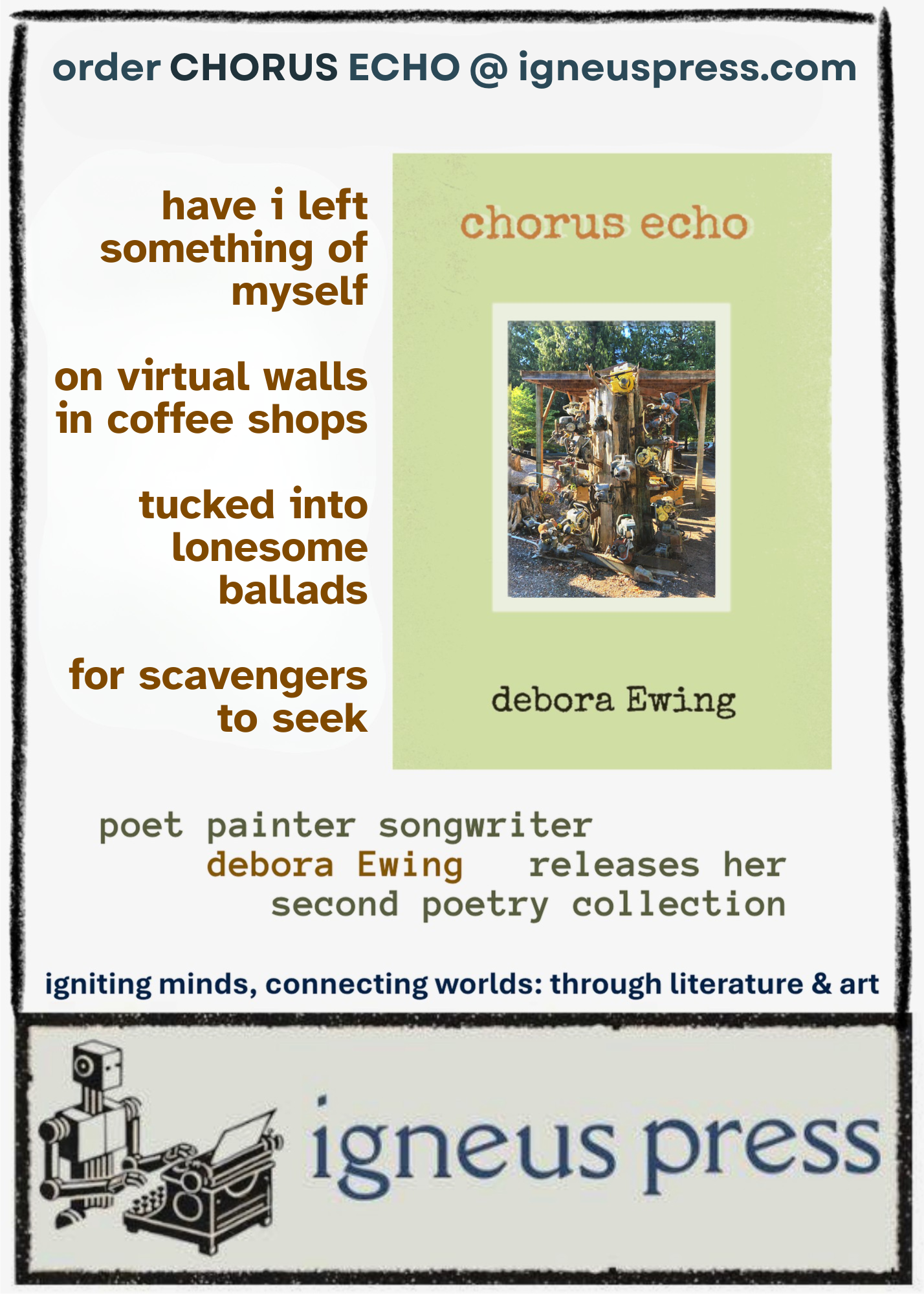Popoloheno: Songs of Resilience and Joy
Finding Aloha
“We can never be satisfied as long as our children are stripped of their self‐hood and robbed of their dignity by signs stating: “For Whites Only” – M.L.K – I have a Dream 1963.
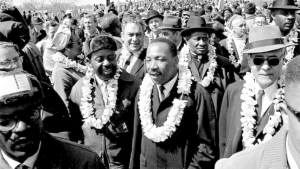
courtesy of thecoconet.tv
Little Girl Dreams
Māhealani Uchiyama was a little girl when she fell in love with dance. She loved the grace, loved the movement and wanted to be a part of it. She wanted to feel the grace and the fluidity in her body. She wanted to learn, and ballet was her doorway. As a little girl, like many little girls do, she wanted to be a ballerina. She knew in her whole being she needed to dance.
Dance, like music, is a spiritual experience. It can change the shape of the world. It can change how you walk through life, how you view things. As a people, we know this inherently but we don’t always acknowledge the sacred arts for the connection to something deeper.
Back in the 1960s segregation ran fierce even in the arts community and just like everything else, little Black girls weren’t allowed in the dance studios. Ballet studios wouldn’t take Māhealani in and teach her. She longed to be a part of a community who could accept her for who she was, a little girl with a dream.
As a little girl Māhealani saw a picture of MLK wearing a lei, not understanding at the time how much this man would shift her trajectory. What this picture symbolized for little Māhealani was hope, love, joy, and peace. She saw how Hawaiian culture gave warmth and Aloha, accepted and loved African Americans when the rest of the country would not.
Māhealani’s mama found a way to bring joy to Māhealani, to fulfill her dream. Enter – Aloha. Hawaiians and Hula embraced Māhealani where ballet did not. Just as Hawaii welcomed MLK and the African American community with open arms, so did Hula for this little girl.

Māhealani Uchiyama, photo by Jeremy Allen
The Loving Arms of Aloha
Hawaii offered a safe place for us Black people in a time where we were deep in the fight for peace and equality. Māhealani fell in love with Hawaiian culture at a young age; this makes sense when we understand the love and acceptance Hawaiians gave to Black people. Māhealani fully embraced the culture and as she grew into a young woman, she went off to study at the University of Hawaii. She was the first in her family and the first in her age group to go to college.
Māhealani became a professor of Hawaiian language at Stanford and under her primary Kumu, she started the Uniki process to become a Kumu Hula, or teacher. It would be several years of study before she was given permission by her Primary Kumu to teach Hula herself. Māhealani has studied and taught Hawaiian culture and Hula for many years.
The Album
As an advocate for cultural understanding, Māhealani’s experience as an award-winning dancer & choreographer, a Kumu Hula, recording artist, musician, composer, as well as her own experience as a Black woman living on Hawaii (sometimes the only Black woman in a town for months) laid the foundation for what was to come.
Fast forward to today. Māhealani produced a beautiful album with musicians from the diaspora and Hawaii to engender awareness of the existence of Black Hawaiians and to the long, deep historical connection Black people have with Hawaii. Māhealani’s new album Popoloheno: Songs of Resilience and Joy honors the lives of Black people and Black Hawaiians and contributions they have made in Hawaii. Through this album, Māhealani honors this deeper connection to her roots with Hawaiian culture and reawakens a sense of belonging for Hawaiians of African descent by sharing stories and songs.

Pōpoloheno berry
Pōpoloheno – Songs of Resilience & Joy
“Pōpoloheno is named after the pōpolo, a black colored berry which is found throughout Polynesia. It is valued for its medicinal qualities. In Hawaiʻi it has become associated with people of African descent because of its rich, dark coloring. Due to subsequent colonial thoughts and practices, the term has since been used as a pejorative. The project is reclaiming the word and honoring the positive meanings of the pōpolo.” (centerforinternationaldance.org)
What was the catalyst for this album?
Māhealani recalls her own experience being sometimes the only Black person on the island for months on end. She shared that sometimes it felt isolating and she didn’t always feel accepted. She knew Black Hawaiians and she knew the history and deep connection between Black people and Hawaii. She was a product of this history and wanted to share this history. Māhealani had an experience with a student of hers who was a young Black Hawaiian girl who was struggling with identity and was made to feel she didn’t belong even though one of her parents was Hawaiian. “People should have a sense of belonging”. So this little girl was a big part of her inspiration. Māhealani knows what it is like to constantly struggle to fit in and to find places that truly honor and accept Black people.
With a mission to help create a world where little girls, or anyone for that matter, feel they belong, this album helps to do just that. Popoloheno: Songs of Resilience and Joy brings awareness of the history between Black people and Hawaiians, the mutual respect and understanding and aloha they share.
Who contributed to the album?
Māhealani and each of the composers chose whose story they wanted to highlight and write for the album through the list Māhealani had offered. The list was so long they weren’t able to create a song for them all. Hawaiian music legends also contributed to the project including Ikaika Blackburn, Daniel and Nani Carvalho (Kailua Moon), Justin Firmeza, Hanale Kaʻanapu and Jerome Koko (Makaha Sons), Wailau Ryder and Nathaniel Māhealani Stillman.
Advisers on Pōpoloheno are Adam Keawe Manolo-Camp (Historian & Sociologist), Dr. Akiemi Glenn (Historical Consultant), Dr. Puakea Nogelmeier (Hawaiian Language Resource) and Dr. Kalei Nuʻuhiwa (Hawaiian Epistemology and Protocol Guidance).

